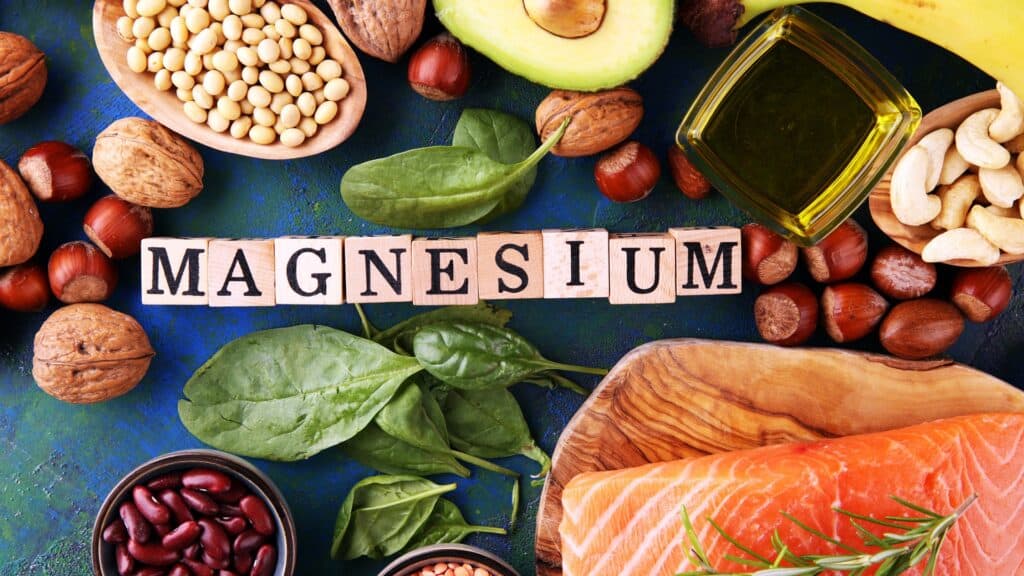Calcium and magnesium are essential minerals that play a crucial role in the development and maintenance of healthy bones and teeth. For breastfeeding mothers, getting enough of these minerals is especially important, as they are needed to support the growth and development of their baby’s bones and teeth.
In this article, we will explore the importance of calcium and magnesium in breastfeeding, their dietary sources, and the potential risks and side effects associated with their supplementation.
Calcium and magnesium are two of the most abundant minerals in the human body, with calcium being primarily found in bones and teeth, and magnesium being involved in over 300 biochemical reactions in the body. Both minerals are important for maintaining healthy muscle and nerve function, as well as regulating blood pressure and blood sugar levels.
While many people get enough of these minerals through their diet, breastfeeding mothers may need to pay extra attention to their intake to ensure that they are meeting their needs and their baby’s needs.
Importance of Calcium and Magnesium in Breastfeeding
During pregnancy and lactation, a mother’s body requires increased amounts of calcium and magnesium to support the growth and development of her baby’s bones and teeth. If a mother’s diet is lacking in these minerals, her body may draw from her own stores, which can put her at risk for osteoporosis and other health issues later in life.
In addition, research has shown that low levels of calcium and magnesium in breast milk may be linked to an increased risk of rickets and other bone disorders in infants.
Understanding Calcium and Magnesium

Calcium and magnesium are essential minerals for maintaining good health in breastfeeding mothers and their babies. Calcium is important for building strong bones and teeth, while magnesium plays a role in muscle and nerve function, as well as regulating heart rhythm.
The recommended dietary allowances for calcium and magnesium vary depending on age and gender. For lactating women, the recommended daily intake is 1,000 milligrams of calcium and 320 milligrams of magnesium.
Calcium and magnesium are found in a variety of foods, including dairy products, leafy green vegetables, nuts, and seeds. However, some women may have difficulty getting enough of these minerals through diet alone and may need to take supplements.
It is important to note that taking excessive amounts of calcium and magnesium supplements can have negative health effects, such as kidney stones and gastrointestinal problems. Therefore, it is recommended to consult with a healthcare provider before taking any supplements.
In summary, calcium and magnesium are important minerals for breastfeeding mothers and their babies. It is important to meet the recommended dietary allowances through a balanced diet and, if necessary, supplements under the guidance of a healthcare provider.
Importance of Calcium and Magnesium in Breastfeeding
Calcium and magnesium are essential minerals required for various physiological functions in the human body. They play a crucial role in the development and maintenance of healthy bones, teeth, and muscles.
During pregnancy and lactation, the demand for calcium and magnesium increases significantly, and breastfeeding mothers need to ensure that they are getting an adequate amount of these minerals in their diet.
Breastfeeding is the primary source of nutrition for infants, and breast milk is a rich source of calcium and magnesium. The concentration of these minerals in breast milk is influenced by the mother’s dietary intake, and inadequate intake can lead to a deficiency in the breastfed infant.
Therefore, it is essential for breastfeeding mothers to consume a balanced diet that includes foods rich in calcium and magnesium.
Calcium is required for the development and growth of bones and teeth in infants. It also plays a critical role in muscle contraction, nerve function, and blood clotting.
Magnesium, on the other hand, is required for the activation of enzymes involved in energy metabolism and protein synthesis. It also plays a crucial role in the regulation of muscle and nerve function.
During the first few days after delivery, the breast produces a thick, yellowish fluid called colostrum, which is rich in calcium and magnesium. This fluid is essential for the development of the infant’s immune system and provides protection against infections.
As lactation progresses, the concentration of these minerals in breast milk decreases, but it still remains a rich source of calcium and magnesium.
Calcium and magnesium are also transferred from the mother to the fetus during pregnancy through the placenta. Therefore, it is essential for pregnant women to consume an adequate amount of these minerals to ensure optimal fetal development.
In summary, calcium and magnesium are essential minerals required by breastfeeding mothers to ensure the optimal growth and development of their infants. Breast milk is a rich source of these minerals, and breastfeeding mothers need to consume a balanced diet to ensure an adequate intake.
Dietary Sources of Calcium and Magnesium

Calcium and magnesium are essential minerals that play a vital role in the growth and development of bones and teeth, as well as in the proper functioning of the nervous system, muscles, and heart.
Breastfeeding mothers need to ensure that they are getting enough of these minerals to support the growth and development of their baby’s bones and teeth.
Here are some dietary sources of calcium and magnesium that breastfeeding mothers can include in their diet:
- Dairy products: Milk, cheese, and yogurt are rich sources of calcium. They also contain magnesium, which helps the body absorb calcium.
- Vegetables: Dark green leafy vegetables like kale, spinach, and broccoli are good sources of both calcium and magnesium.
- Legumes: Beans, lentils, and chickpeas are rich in magnesium and also contain some calcium.
- Fruits: Figs, oranges, and apricots are good sources of calcium.
- Fish: Mackerel is a good source of both calcium and magnesium.
- Tofu: Tofu made with calcium sulfate is a good source of calcium.
- Almonds: Almonds are a good source of magnesium.
- Whole grains: Brown rice, oats, and quinoa are good sources of magnesium.
- Cabbage: Cabbage is a good source of calcium.
- Soy milk: Soy milk fortified with calcium and magnesium is a good alternative to dairy milk for those who are lactose intolerant or vegan.
Breastfeeding mothers should aim to include a variety of these foods in their diet to ensure they are getting enough calcium and magnesium. It is important to note that excessive intake of calcium and magnesium supplements can lead to adverse effects, so it is best to get these minerals from dietary sources.
Calcium and Magnesium Supplements
Calcium and magnesium are essential minerals that play a vital role in maintaining bone health and overall bodily functions. During breastfeeding, the body requires a higher amount of calcium and magnesium to support the growth and development of the baby.
Calcium supplements are commonly recommended for breastfeeding mothers to ensure adequate calcium intake. Calcium supplements can be taken in the form of tablets, capsules, or powders.
It is important to note that excessive calcium intake can lead to constipation, so it is recommended to start with a low dose and gradually increase as needed.
Magnesium supplements are also important for breastfeeding mothers as they help regulate muscle and nerve function, as well as support bone health.
Magnesium supplements can be taken in the form of tablets, capsules, or powders. It is important to note that excessive magnesium intake can lead to diarrhea, so it is recommended to start with a low dose and gradually increase as needed.
It is recommended to take calcium and magnesium supplements together, as they work in synergy to support bone health and overall bodily functions. Some mineral supplements, such as multivitamin-mineral supplements, may also contain calcium and magnesium.
Vitamin D supplements are also important for breastfeeding mothers as they help the body absorb calcium and support bone health. It is recommended to take vitamin D supplements in addition to calcium and magnesium supplements.
When choosing supplements while breastfeeding, it is important to consult with a healthcare professional to ensure that the supplements are safe and appropriate for the individual’s needs.
TheraNatal Lactation Complete is a popular multivitamin-mineral supplement specifically designed for breastfeeding mothers, which contains calcium, magnesium, and vitamin D among other essential nutrients.
Effects on Breastfeeding Mothers

Calcium and magnesium are essential minerals for breastfeeding mothers. They help in maintaining strong bones, teeth, and muscles. In addition, they also play a vital role in regulating the body’s functions.
Breastfeeding mothers require more calcium and magnesium than non-breastfeeding women. This is because calcium and magnesium are essential for milk production and maintaining the mother’s health.
Calcium and magnesium also help in preventing vitamin D deficiency, which is common in breastfeeding mothers. Vitamin D plays a crucial role in maintaining bone health and preventing osteoporosis.
Breastfeeding mothers who consume adequate amounts of calcium and magnesium are less likely to suffer from pre-eclampsia, a pregnancy complication characterized by high blood pressure and damage to organs.
Moreover, calcium and magnesium can also help relieve constipation, which is a common problem in breastfeeding mothers.
Calcium and magnesium also have an impact on menstruation and hormones. They help in regulating the menstrual cycle and maintaining hormonal balance. Prolactin, a hormone that stimulates milk production, is also regulated by calcium and magnesium.
In conclusion, calcium and magnesium are essential minerals for breastfeeding mothers. They help in maintaining bone health, preventing vitamin D deficiency, relieving constipation, and regulating hormones.
Recommended Intake and Considerations
Calcium and magnesium are essential minerals for maintaining good health during lactation. The recommended daily intake of calcium for lactating women aged 19-50 years is 1,000 milligrams (mg) per day.
The recommended daily intake of magnesium for lactating women aged 19-30 years is 310 mg per day, and for those aged 31-50 years, it is 320 mg per day.
It is important for lactating women to consume a balanced diet that includes foods rich in calcium and magnesium. Good sources of calcium include dairy products, leafy green vegetables, and fortified foods. Good sources of magnesium include whole grains, nuts, and seeds.
While routine supplementation of calcium and magnesium is not necessary for most lactating women who consume a healthy diet, some women may benefit from supplementation if they are unable to meet their daily requirements through diet alone.
However, it is important to consult with a healthcare provider before starting any supplementation regimen.
It is also important to note that excessive intake of calcium and magnesium supplements can have negative health consequences. High levels of calcium can lead to constipation, kidney stones, and interfere with the absorption of other minerals such as iron and zinc. High levels of magnesium can cause diarrhea, nausea, and interfere with the absorption of calcium.
In conclusion, lactating women should aim to consume a balanced diet that meets their daily requirements for calcium and magnesium. Routine supplementation is not necessary for most women, but may be recommended for those who are unable to meet their daily requirements through diet alone.
It is important to consult with a healthcare provider before starting any supplementation regimen to ensure proper dosing and avoid negative health consequences.
Potential Risks and Side Effects

While calcium and magnesium are generally considered safe for breastfeeding women, there are still potential risks and side effects to be aware of. It is important to consult with a healthcare professional before taking any supplements, especially if you are taking medications or using birth control.
1. Medications
Some medications may interact with calcium and magnesium supplements, including antibiotics, blood pressure medications, and thyroid medications. These interactions can affect the absorption and effectiveness of both the medication and the supplement.
2. Birth Control
Calcium and magnesium supplements may also interfere with the effectiveness of hormonal birth control methods, such as the pill or patch. This is because calcium and magnesium can bind to estrogen and progesterone, reducing their absorption and effectiveness.
3. Oral Absorption
While oral calcium and magnesium supplements are generally safe, they can cause gastrointestinal side effects such as constipation, diarrhea, and nausea. It is important to take supplements with food to help with absorption and reduce the risk of side effects.
4. Intravenous Magnesium
Intravenous magnesium is sometimes used to treat certain conditions during pregnancy, such as pre-eclampsia and eclampsia. However, it should only be administered under the supervision of a healthcare professional, as it can cause serious side effects such as low blood pressure and respiratory depression.
5. Intravenous Magnesium Sulfate
Intravenous magnesium sulfate is also used to treat pre-eclampsia and eclampsia, but it carries additional risks. It can cause muscle weakness, heart problems, and even coma or death in rare cases.
6. Randomized Clinical Trial
A randomized clinical trial found that calcium and magnesium supplements did not significantly improve breastfeeding outcomes, such as milk production or infant growth. However, the study did not find any significant side effects from the supplements either.
Overall, while calcium and magnesium supplements are generally safe for breastfeeding women, there are potential risks and side effects to be aware of. It is important to consult with a healthcare professional before taking any supplements, especially if you are taking medications or using birth control.
Calcium and Magnesium in Different Countries
Calcium and magnesium are essential minerals for breastfeeding mothers. They help in the development of bones, teeth, and muscles of both the mother and the baby. However, the availability of these minerals in different countries varies due to several factors such as soil composition, dietary habits, and food processing methods.
United States
In the United States, calcium and magnesium are readily available in the diet. The recommended daily intake for calcium is 1,000 mg per day for women aged 19-50 years and 1,300 mg per day for pregnant or breastfeeding women.
The recommended daily intake for magnesium is 320 mg per day for women aged 19-30 years and 350 mg per day for pregnant or breastfeeding women.
Calcium and magnesium are found in a variety of foods such as dairy products, leafy green vegetables, fortified cereals, and nuts. Calcium and magnesium supplements are also available over the counter.
Canada
Similar to the United States, calcium and magnesium are readily available in the diet in Canada. The recommended daily intake for calcium is 1,000 mg per day for women aged 19-50 years and 1,300 mg per day for pregnant or breastfeeding women. The recommended daily intake for magnesium is 310 mg per day for women aged 19-30 years and 350 mg per day for pregnant or breastfeeding women.
Calcium and magnesium are found in a variety of foods such as dairy products, leafy green vegetables, fortified cereals, and nuts. Calcium and magnesium supplements are also available over the counter.
Europe
In Europe, the availability of calcium and magnesium in the diet varies depending on the country. In general, the recommended daily intake for calcium is 800-1,200 mg per day for women aged 19-50 years and 1,000-1,500 mg per day for pregnant or breastfeeding women.
The recommended daily intake for magnesium is 300-400 mg per day for women aged 19-30 years and 350-400 mg per day for pregnant or breastfeeding women.
Calcium and magnesium are found in a variety of foods such as dairy products, leafy green vegetables, fortified cereals, and nuts. However, in some countries, the consumption of dairy products is low, which may lead to inadequate calcium and magnesium intake.
Calcium and magnesium supplements are also available over the counter.
Overall, calcium and magnesium are essential minerals for breastfeeding mothers. The availability of these minerals in the diet varies depending on the country, but they can be obtained through a balanced diet and supplements if necessary.
Special Diets and Breastfeeding
Breastfeeding mothers who follow a vegan or vegetarian diet may be at risk of calcium and magnesium deficiency. Calcium and magnesium are essential minerals for the growth and development of the baby’s bones and teeth, as well as for the mother’s overall health.
While it is possible to obtain sufficient calcium and magnesium from a plant-based diet, it may require careful planning and monitoring. Vegan sources of calcium include fortified plant milks, tofu, leafy greens, and calcium-fortified cereals. Vegan sources of magnesium include nuts, seeds, legumes, and whole grains.
Breastfeeding mothers who consume animal products, including animal protein, are less likely to be deficient in calcium and magnesium. Animal products are rich in these minerals, particularly dairy products such as milk, cheese, and yogurt.
It is important for breastfeeding mothers to maintain a balanced and varied diet that includes sources of calcium and magnesium. They may also consider taking a calcium and magnesium supplement if they are unable to meet their daily requirements through diet alone.
Overall, while special diets can be compatible with breastfeeding, it is important for mothers to be aware of their nutrient intake and to consult with a healthcare professional if they have any concerns.
Other Nutrients and Breastfeeding
In addition to calcium and magnesium, breastfeeding mothers should also ensure they are getting enough of other essential nutrients. These nutrients can help support both the mother’s health and the growth and development of the baby.
Vitamin D is important for bone health and can also help boost the immune system. Breastfeeding mothers should aim to get at least 600-800 IU of vitamin D per day. This can be achieved through sunlight exposure, vitamin D supplements, or foods such as fatty fish, egg yolks, and fortified dairy products.
Other important vitamins for breastfeeding mothers include vitamins A, C, and E, which act as antioxidants and help support the immune system. B vitamins, such as vitamin B1, B2, B6, and B12, are also important for energy metabolism and nerve function.
Breastfeeding mothers should also make sure they are getting enough iron, as low iron levels can lead to fatigue and anemia. Iron-rich foods include red meat, poultry, fish, beans, and fortified cereals.
Zinc is another important mineral for both the mother and baby, as it plays a role in immune function and wound healing. Good sources of zinc include meat, seafood, nuts, and seeds.
It is also important for breastfeeding mothers to stay hydrated and consume enough water throughout the day. This can help support milk production and prevent dehydration.
Omega-3 fatty acids, found in fish and some plant sources, are important for brain and eye development in the baby. Breastfeeding mothers may consider taking an omega-3 supplement or consuming foods such as salmon, sardines, and flaxseeds.
Iodine is important for thyroid function and can be found in iodized salt, seafood, and dairy products. Folic acid, found in leafy greens, beans, and fortified grains, is important for the baby’s neural tube development.
In summary, breastfeeding mothers should aim to consume a balanced diet rich in a variety of nutrients to support both their own health and the growth and development of their baby.
Conclusion
Calcium and magnesium are essential minerals that play a vital role in the health of both the mother and the baby during breastfeeding. Adequate intake of these minerals is necessary to ensure proper bone development and maintenance, muscle function, and nerve transmission.
Research suggests that calcium and magnesium supplementation may help improve milk production and quality, reduce the risk of postpartum depression, and alleviate symptoms of premenstrual syndrome in breastfeeding mothers. However, more studies are needed to confirm these findings.
It is important to note that excessive intake of calcium and magnesium may have adverse effects on health. Therefore, it is recommended to consult with a healthcare provider before starting any supplementation.
Breastfeeding mothers can increase their calcium and magnesium intake by consuming a balanced diet that includes dairy products, leafy green vegetables, nuts, and seeds. Supplementation may be necessary for those who cannot meet their daily requirements through diet alone.
Overall, calcium and magnesium are crucial minerals for breastfeeding mothers and their babies. Adequate intake should be prioritized to promote optimal health outcomes.
Related Post: Magnesium Glycinate While Breastfeeding
Frequently Asked Questions
Does magnesium affect breast milk production?
Magnesium is an essential mineral that is important for many bodily functions, including muscle and nerve function, blood sugar control, and bone health. While there is no direct evidence that magnesium affects breast milk production, some studies suggest that magnesium deficiency may be associated with low milk supply.
However, more research is needed to fully understand the relationship between magnesium and breast milk production.
What is the recommended dosage of calcium/magnesium/zinc to increase milk supply?
There is no standard recommended dosage of calcium, magnesium, or zinc for increasing milk supply. However, some studies suggest that taking a combination of these minerals may help improve milk production in breastfeeding mothers.
It is important to talk to a healthcare provider before taking any supplements, as excessive intake of these minerals can cause side effects.
What is Kellymom’s stance on calcium and magnesium for breastfeeding?
Kellymom is a reputable source of information on breastfeeding and parenting. According to Kellymom, taking calcium and magnesium supplements may help improve milk production in some women.
However, it is important to talk to a healthcare provider before taking any supplements, as excessive intake of these minerals can cause side effects.
What is the recommended dosage of evening primrose oil for breastfeeding?
Evening primrose oil is a supplement that is often used to help improve milk supply in breastfeeding mothers. However, there is no standard recommended dosage of evening primrose oil for breastfeeding.
It is important to talk to a healthcare provider before taking any supplements, as excessive intake of evening primrose oil can cause side effects.
Which type of magnesium is best for breastfeeding?
There are several different types of magnesium supplements available, including magnesium citrate, magnesium oxide, and magnesium glycinate. While there is no clear consensus on which type of magnesium is best for breastfeeding, some studies suggest that magnesium glycinate may be better absorbed by the body than other forms of magnesium.
Do breastfeeding moms need calcium and magnesium supplements?
Breastfeeding mothers need adequate amounts of calcium and magnesium to support their own health and the health of their baby. While it is possible to get these minerals from a healthy diet, some women may benefit from taking supplements to ensure they are getting enough. It is important to talk to a healthcare provider before taking any supplements, as excessive intake of these minerals can cause side effects.

Iesha is a loving mother of 2 beautiful children. She’s an active parent who enjoys indoor and outdoor adventures with her family. Her mission is to share practical and realistic parenting advice to help the parenting community becoming stronger.
